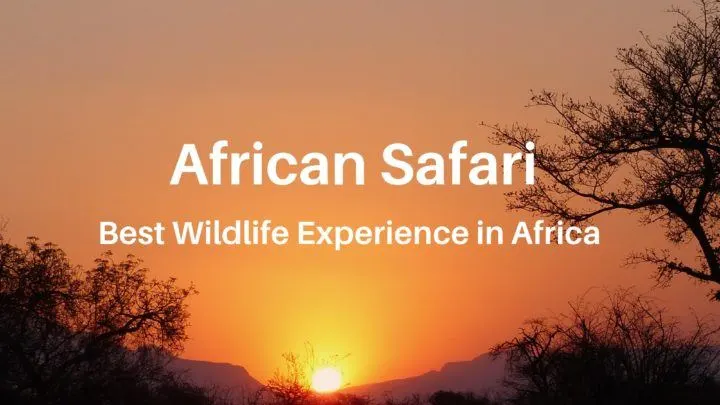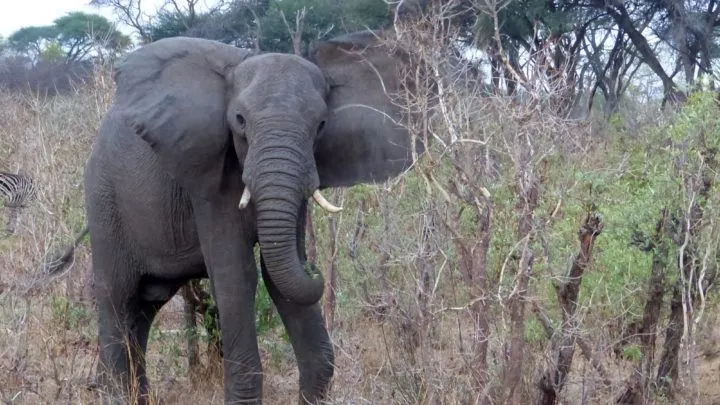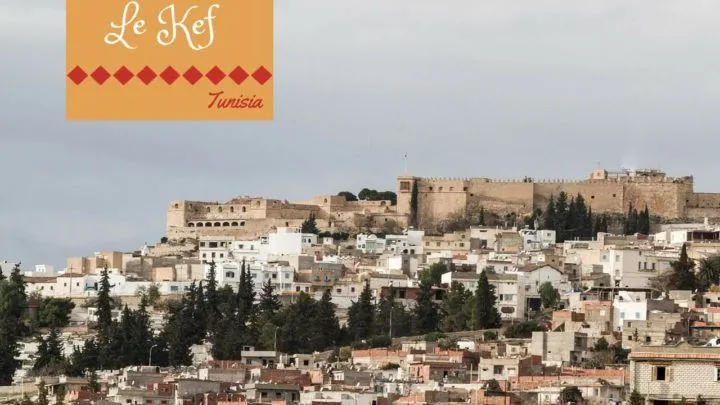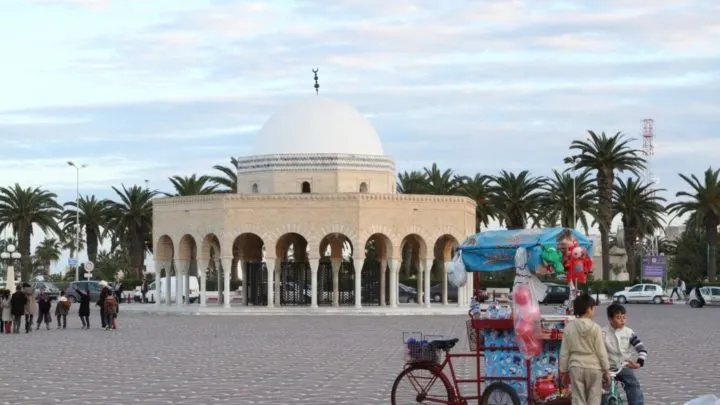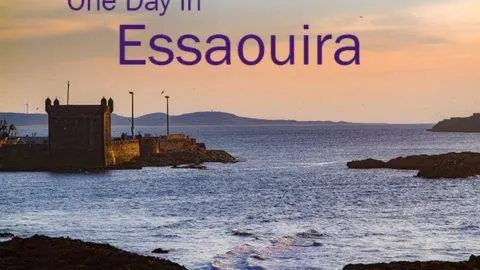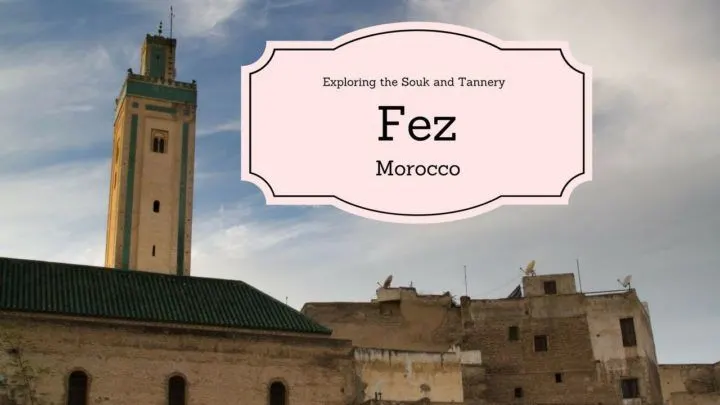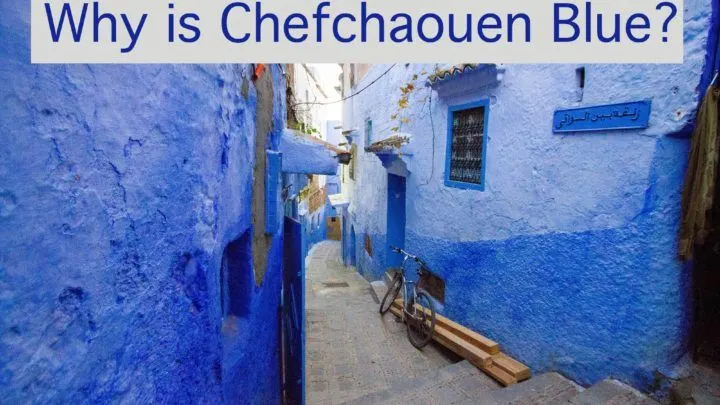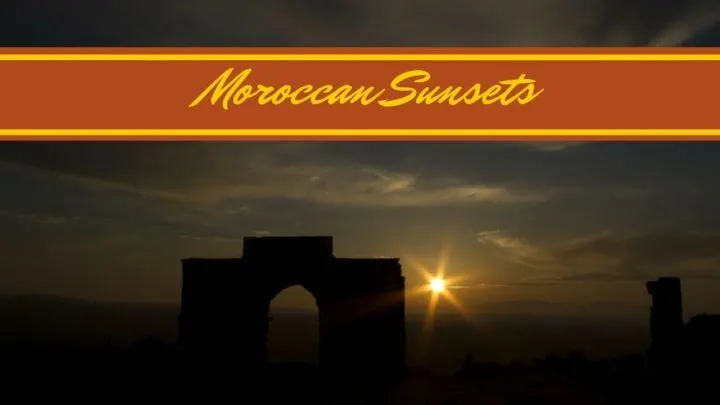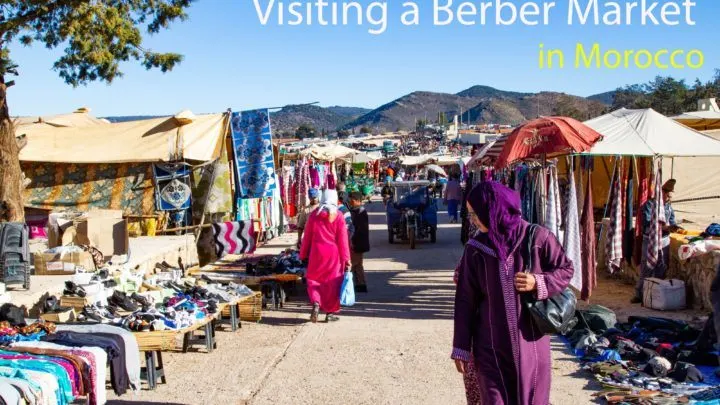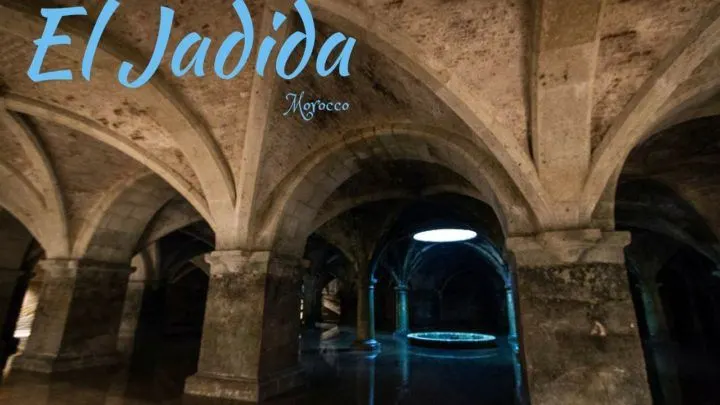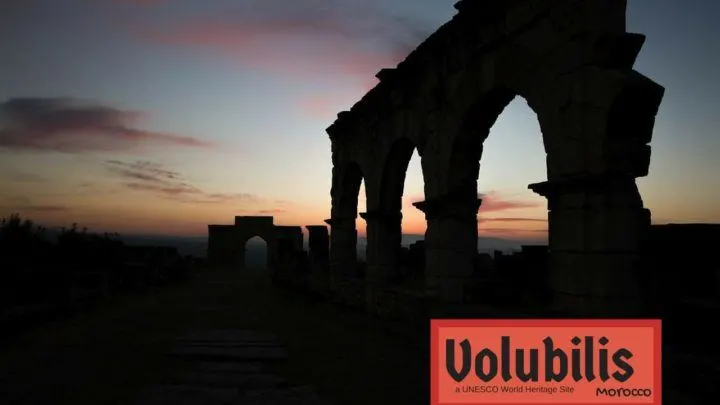On this podcast episode, we talk to Eva Westerling and learn all about hiking in the Moroccan desert. We find out how she found love on her desert hike and made the move to live in this North African country.
Or you can always subscribe to one of these:
Apple Podcasts
Google Podcasts
Spotify
Amazon Music
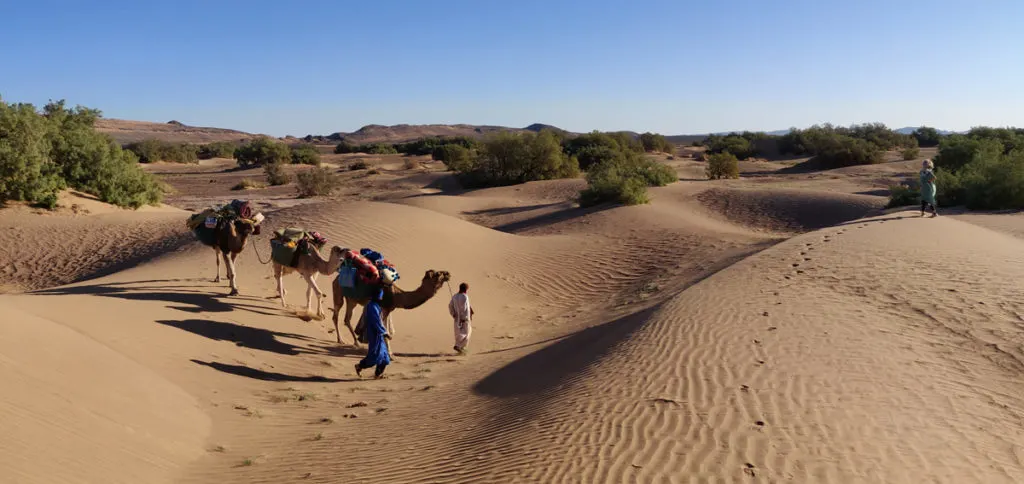
This episode is chock full of great information is you plan on visiting the exotic and amazing country of Morocco. We talk with Moroccan resident and business owner, Eva Westerling. We find out how she met, fell in love, and made Morocco her home after her desert hiking experience.
Eva shares with us everything about planning a hike, what carries your stuff for you, what you eat, and how rough the terrain is when hiking in the desert of Morocco.
We also get to learn more about Moroccan communities, especially the one she lives in called Merzouga.
And to round things out, we learn some great tips for visiting Morocco.
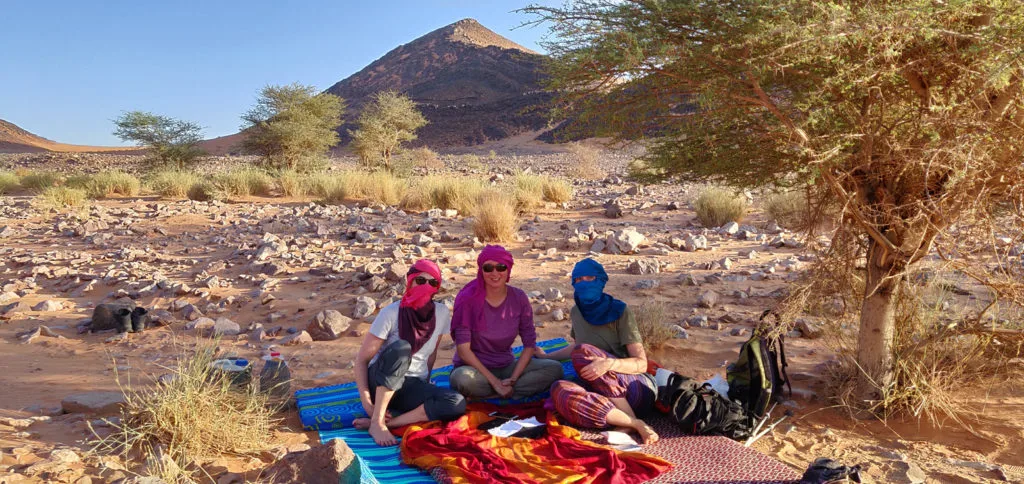
Show Notes
0:29 – How did Eva end up in Morocco?
3:22 – First trip hiking in Morocco
9:36 – Moving to Merzouga
10:16 – The nitty gritty of how it all works
12:10 – Fitting into the community
18:10 – Supporting women businesses?
23:53 – An example of a trip they ran recently
31:17 – The terrain
34:52 – The food
41:33 – Tips for Visiting Morocco
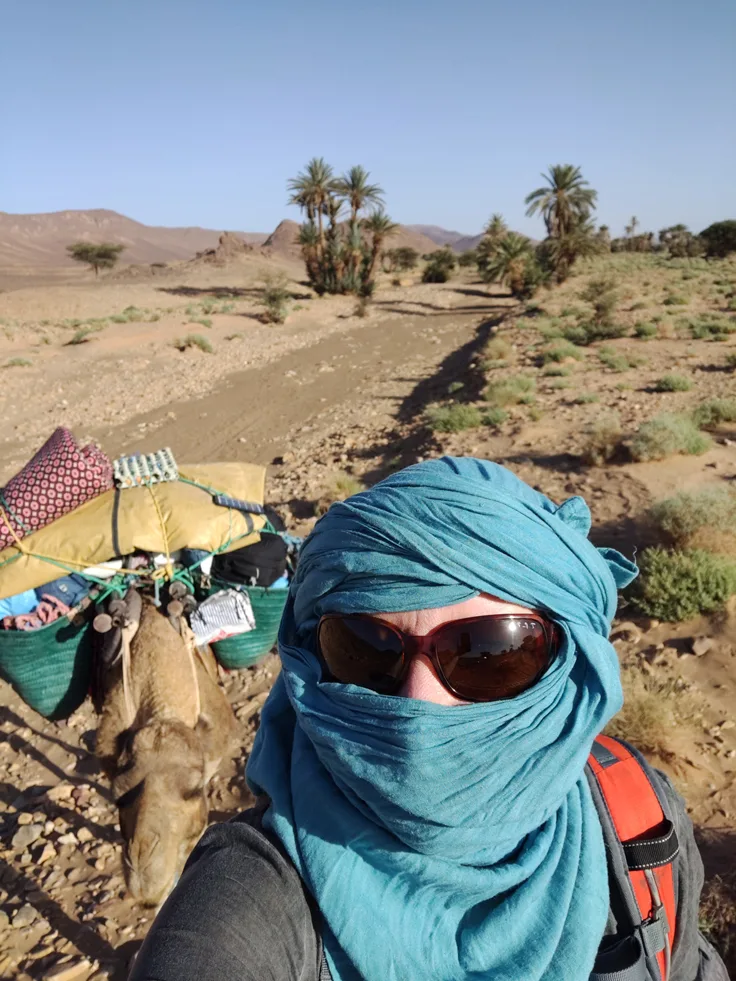
Other inspiring interviews with intrepid travelers:
Guinness World Record Climbers – Iain and Adam
Judging Tiramisu with Christina and Cynthia
Phoebe Thomas’ Amazing Travel Stories
Thoughtful Travel with Amanda Kendle
Coritta Travels with her Family
Jennifer Lloyd Talks about Travel to Volunteer for Animals
Morgan and Sage – Hiking in the Dolomites
Kirsten Discusses Travel with Kids
Mary Jo tell us about her book – Secret in Seattle
Marissa tells us about finding her Irish Ancestors
Worth Mentioning
Berber Adventures
Not Scared of the Jetlag
Morocco
Marrakesh
Merzouga
Essaouira
Tajine
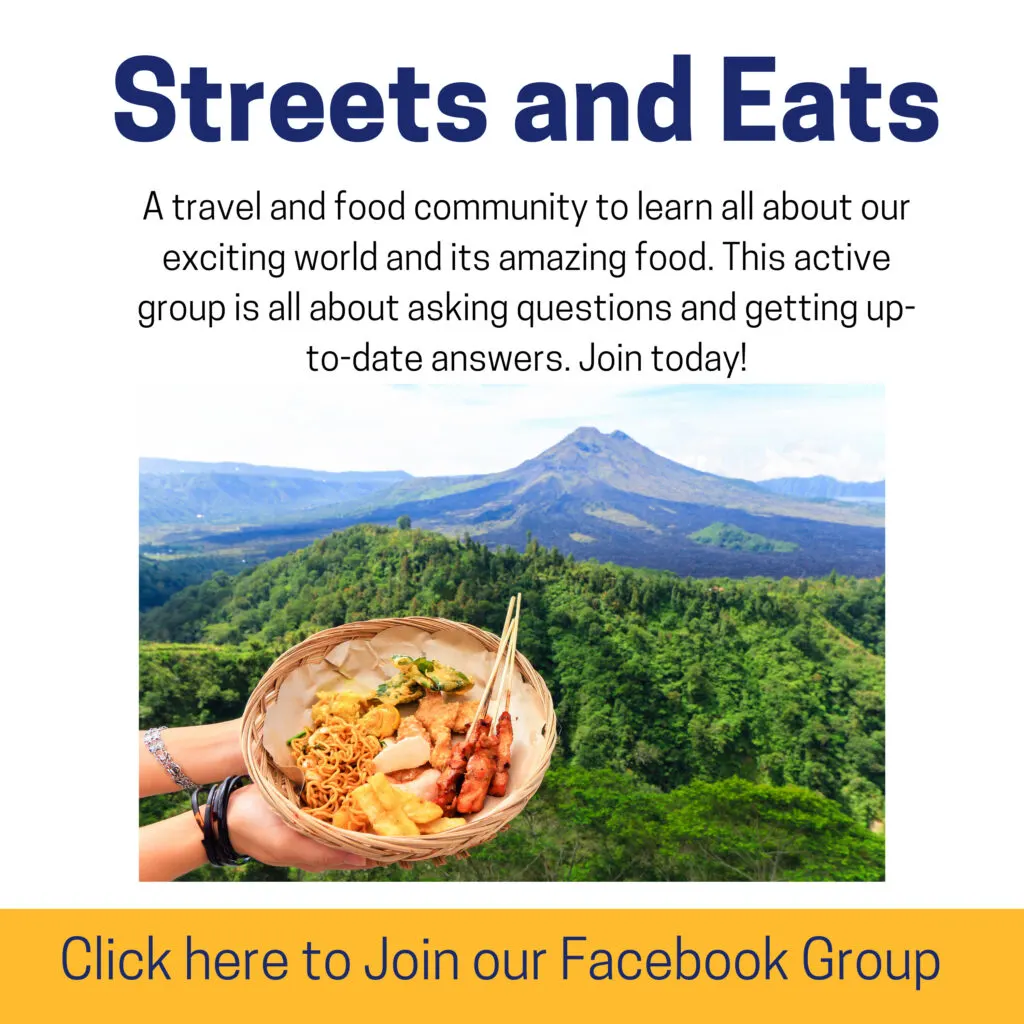
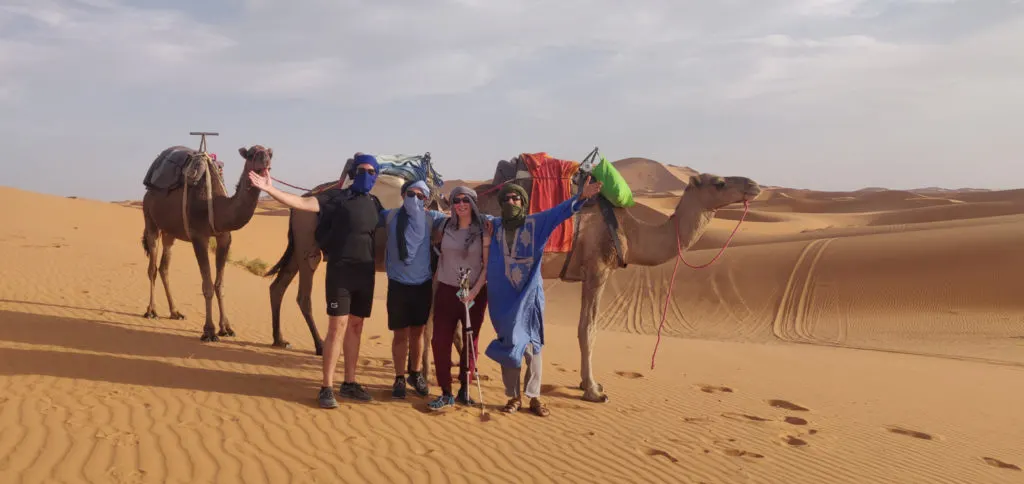
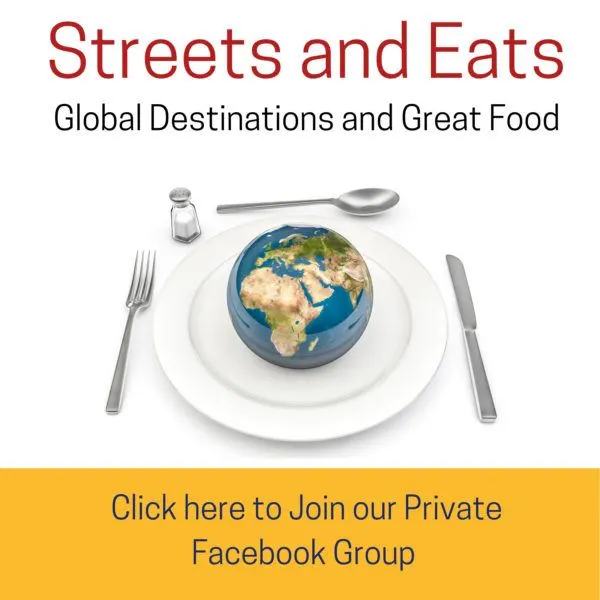
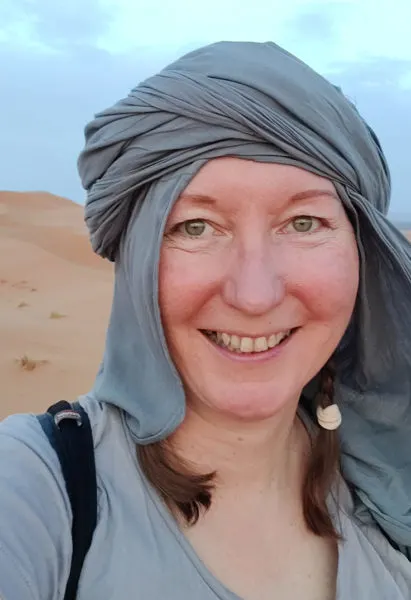
If you enjoyed Hiking the Desert in Morocco...
Full Transcript of Show
Corinne 0:00
Well, Hi there, welcome to this episode of Streets and Eats. And this week we’re talking to Eva Westerling, who, originally from Germany, is now living in Morocco. And boy does she have a story to tell.
Jim 0:13
Welcome to Streets and Eats the podcast where we want to inspire your next trip by telling you about some fantastic destinations, and the best food to eat while you’re there. Now remember, until the world opens completely back up, and you feel safe to travel again, use this time to research and plan. That’s what we’re here for.
Corinne 0:29
Eva, how did you get to Morocco?
Eva 0:34
Hi, yeah, so let me go back a few years for this one. I went on a holiday to Oman in 2016, at the end of 2016. And it was a desert hiking trip, it was long days of nothing really just walking, walking, walking in the heat. And I had so much time to think and I realized that I didn’t like my life in Germany anymore. I was working as a hospital consultant, which was fantastic in a way because I got to travel all over the world. I had projects in Kurdistan, in India, in Chile, and lots of places. But I had a very disorganized boss, and there were periods in between where I had nothing to do. And I just kind of got annoyed with life in general. And I came back from this holiday in Oman. And I felt like I needed to change my life. Like I really needed to do something different. I wanted to live abroad.
Corinne 1:29
You had that aha moment. We’ve all had them I think.
Eva 1:33
Yes, I mean, it’s been there for a while before, you know, like, on and off. But like, I came back, and I had the strong feeling that something has to change. And fairly soon. So I researched a lot about options of what could I do living abroad? Where would I want to go? What do I want to do and couldn’t really find something that I really love so much. So I figured, okay, one step at a time, I’ll just start saving money.
Eva 1:58
So with this job, I actually made good money. But the years before I just spend it all, because it was so nice to finally make some proper money. Mostly on traveling, but also on clothes and stuff for the apartment. And I don’t know. So for two years, basically, I didn’t spend any money. Except for travels, I still traveled and I still went out for dinner because like you I love food. So there’s no way I stopped eating. But no clothes, no electronics, no nothing. And I didn’t set a time, I just thought, “Okay, I just save as much as I can. And then when the time is right when there’s a sign somehow I know now’s the time to go, I quit and I just go and then I’ll figure it out.”
Eva 2:42
And at the same time I started my travel blog, “Not Scared of the Jetlag.” Just to give myself some time to learn how to do it like the technicalities, like, how do you edit photos? And you know, you need to improve writing and stuff. Like I’m not a natural born writer. I’m a scientist like it, you know, that really worked for me. And, yeah, so for, I think it was like two years, I just stuck it out in the job. And at least after one year, I got a new boss who had really good potential on paper, but also turned out not to really improve the situation.
Eva 3:22
And then at the end of 2018, I, I went on a desert hiking holiday in Morocco with a woman from Australia. She had this crazy idea to hike along the edge of the Sahara, all through Morocco, basically for a month or two. And she had talked about that or spoken about that on a podcast. And I had listened to that and I was like, “Oh my god, I so want to join her for that.”
Corinne 3:52
And you didn’t know her prior to this?
Eva 3:56
No, I didn’t have any idea. So that podcast has a Facebook group that always posts the current episode. So I just commented under that episode, like, “Oh my god, I would so love to go on that trip.” And she actually answered and she said, “Okay, let’s talk.” And that was like in March or something, March or April. And then in September, we said, “Okay, let’s get real, like, how are we going to do this?” And I said, “I would love to come but not for a month or two. I would just like to do maybe two weeks. Embedded in a month long holiday in Morocco, but I wouldn’t want to hike so long.”
Eva 4:36
And so yeah, that happened. We met up in Marrakech. I traveled a week before and then we started hiking. And it was, it was a bit funny. She had found this guy who lives in Merzouga, who had told her he can organize this for her. But nobody had ever walked the path from Zagora to Merzouga, which she chose for this trip, before. I mean, maybe people had but nobody knew anyone who had. It’s not like a common route. And so he had told her it would be between 10 and 12 days.
Eva 5:09
And I have some desert hiking experience. I’ve actually done another hiking trip in Morocco in 2015, a group trip hiking in the desert. And I cannot remember how much like how many kilometers we made, and what was comfortable and what was way too much, or would have been way too much. And I thought, yeah, 250 kilometres no way on earth that will make that in 10 to 12 days. But okay, let’s just go, you know, I don’t care. I mean, it’s more about the experience then getting there, right?
Jim 5:41
Yeah that’s like 25 kilometers a day.
Eva 5:48
Yeah. Which is good. It like, which would be doable in like, easy terrain.
Corinne 5:54
Easy terrain where it’s relatively cool, lots of water sources…
Eva 5:59
Exactly. So it was ambitious. So we met the hiking crew just outside of Zagora and put all our things on the camels and started hiking. And after three or four days, it became totally clear that that’s never gonna happen in that timeframe. And she got a bit angry.
Eva 6:20
And I said, “You know, there’s no point in getting upset. Like, it’s just what it is. So if you, if you only have 10, 10 to 12 days, and then you have to be somewhere, I’m sure there’s the option to get picked up. Like, it doesn’t matter. Let’s just enjoy this. Let’s make the most of it.” And she, I think it took her a day to get over that. But yeah, so you know, we just kept walking. And she, she got picked up on day 11. And I just kept walking with the two men crew that we had.
Eva 6:58
So my now boyfriend, Hassan was the guide back then. And there was one other guy from the Zagora area who had the camels. And yeah, they said, “We don’t have a problem, we can just keep walking, you just have to agree on a price with the guy who organized everything.” And so he picked the Australian lady up, so we just negotiated right there. And I said, “Okay, I keep going.” It was like, the most expensive holiday of my life.
Corinne 7:26
Oh, no. Wow. Once in a lifetime, right? Um, but it also brought you to here so…
Eva 7:34
Exactly, that’s the thing. And like I said, I don’t mind paying for adventure and experiences and holidays and everything, you know. Like I saved my money on transport and hotels, like that’s where I try to go cheap. But everything else I am happy to splurge. Yeah, so I finished the trip in Merzouga after 16 days of easy, easy hiking. I mean, I think we averaged like 12 kilometers a day at the end or something. In the early days, there were a couple longer days, but it was really relaxing, and really nice. And then yeah, I went home to Germany.
Eva 8:14
And like three or four days later, my boss invited me to his office and told me that he’s restructuring the department and that probably the type of work that I love doing will not be a big part anymore. And I thought, “Ha, there we go, that’s my sign, like time to quit. Like, I’m not gonna stay here if this gets worse.” So after Christmas, I handed in my resignation, I had, I think seven weeks to get rid of as much as possible. Put the rest of storage with my parents and set off on what was supposed to be like, I don’t want to say a trip around the world because that was never the goal. But just traveling, like long term travel. I didn’t have any agenda. Like, I just thought I go to Morocco first. I’ve just been there. It’s nice. There’s more to see. I know some people now. And then I start traveling when it gets too hot. So I made some plans to meet a friend of mine in Indonesia in the summer.
Corinne 9:17
Where it’s not hot at all.
Eva 9:18
Yeah, but it’s a different hot, actually. And actually, Indonesia has the best climate for travel in July. Who would have thought? But yes, it’s the dry season. So even though it’s hot, it’s not as humid and it was really nice.
Eva 9:36
So yeah, so I went to Merzouga for, I was here for like two and a half months, I think, that first time around and while I was here, got together with Hassan and we started making plans to do another hiking trip in in the fall. So I thought I just asked around on Facebook groups and stuff if we can get some girls together to go on a hiking trip, and maybe we can make a business out of this. And then yeah, it was a bit tricky because of course, half the people already have the year planned with the holidays, they would love to go, but not during that time, la la la…
Eva 10:16
You know, it was really kind of tricky. In the end, we had three girls who wanted to join. One had to drop out last minute because her work canceled her holiday. That was really annoying for all of us, I think. Because she was so excited. But two girls, one of my best friend from Germany, and one of her colleagues actually ended up coming. And we organized the, I don’t know, it was Saturday all the way through Sunday, that week, like how much is that nine days or something in total, nine or 10 days trip with five days hiking in the middle. And they loved it. Like, we got such good feedback from them. And we thought, okay, there is definitely potential for business in this because no one really offers this kind of thing here.
Corinne 11:04
It issomething different, definitely different. So I think that’s the key right there. What can you offer that’s different than everybody else?
Eva 11:11
Yeah, exactly. And also, just with the experience from my hiking trip with that Australian lady, is, you know, like, if you have Moroccan people organize it with nobody who has any business mind or experience with calculating how much things cost and everything? It’s like, there’s really a market for European thinking in planning those things, right. I’m actually, like, I’m actually excelling at that. Like, I know how to do an excel calculation. I can organize things, the German way and things will start on time. But even though that is sometimes a bit hard, because you rely on Moroccans for transports and stuff like that, you know.
Corinne 12:04
In all travel, you need to be flexible. I think that’s the lesson to take.
Eva 12:10
Exactly. That’s true. But also, if you you know, you have to find like a group of people that you trust that you work well with, and that you can rely on to do what you want. Because I mean, half the people here, don’t care about stuff like that, because they don’t get paid well. Like they don’t care if they’re late, because they don’t make much money with what they’re doing. So I always think I’ll just pay them 20% more, and they will love to work for me and do what I want, because they don’t want to lose their job. And you know, so far, yes, but we, I mean, with Corona of course, we haven’t been busy. The few things we have organized., though, we actually did that. And yes, that worked. So yeah, that’s, that’s how I ended up here. Basically.
Jim 13:02
It’s really important to anyway to build that relationship with the local community. And make sure that they see you as a positive influence. It sounds like you really have the key for that.
Eva 13:14
That’s very true. And it’s very hard here because it’s, I mean, I don’t know if you have been to Merzouga but it’s very rural. It’s small. It’s in the middle of nowhere. And while most of the men that work in tourism speak at least French and some of them English. None of the women do. Like if they speak some French it’s like a handful of words. And I actually studied Arabic for a while.
Eva 13:45
But even that doesn’t help here because the people in this village speak Tamazight the local Berber language. You know, it’s really hard, especially if you need to learn it from somebody who doesn’t speak any language you speak. So I am learning but it’s slow. But I’m, I think the main thing from the beginning was to–like the little things. Like dress appropriately, like I always wore long, long legs, either long pants or long skirt or something. Always at least a t shirt covering, properly covering my shoulders. Most of the time, actually something with long sleeves. Always like a scarf to cover any skin that could pop out. And I don’t cover my hair unless it’s very sunny and too hot, then yes, I put something on my head.
Eva 14:43
So I’ve always been showing the kind of the respect for the community, you know, and that’s actually something that Hassan told me while I was away traveling that first summer. He said he heard from a couple of families how the women were saying how much they liked the way I dress and how much they respect that, you know. So that was really nice feedback to get. And so yeah, I kept doing that, of course. I started making local friends like some, of course, the first people I was in contact with were Hassan’s family, his sister’s, his sister in law, who took me to other places, so I got to know more people.
Eva 15:26
And one of my best friends now is a lady who makes dresses, and I actually had her make me some dresses and skirts and pants, because it’s really cheap. And they are tailor made for me. And you know, I actually put money into the country. Why would I buy something from home that I then have to lug down here. I just get stuff, made, you know. And so she she is one of the few women who don’t mind talking, even if we don’t understand each other. And she has a really good way of reading body language and just getting the meaning of what I want. So she’s teaching me so much now that I’m starting to be able to talk about the weather, the food, the children. I don’t know, I could say that I’m moving into a new house and I need to buy a car, but stuff like that, you know.
Corinne 16:19
That’s conversational. That’s really important stuff. I did pretty good when I was living in Germany, I went to the dealer and I negotiated buying a car, and I had them say when I wanted it delivered, and you know, all this stuff. Oh, and also buying a kuchge, a kitchen one time when I was getting the apartment, you know, that kind of stuff? I thought if I can do that, maybe I’m I’m doing okay, I I’m not gonna say I’m fluent, far from it. But I can get the big things done.
Eva 16:51
Yeah, no, you’re totally right. And I mean, I’m definitely not fluent. And I’m sure the grammar is completely wrong. Like, yeah, I, I say, “I go the sunny tomorrow.” So to the next town, you know, but and I think the goal is not even the goal. Like it would be the if you tell a child go away, you know, like that kind of goal. No, they understand it. So who cares?
Corinne 17:18
And it’s going to get better and better.
Jim 17:19
Yeah. And again, you’re making that effort in the community. So you’re becoming more known. Is there any opportunity, and maybe this is something you’ve been doing to include more women in the business?
Eva 17:36
So for, like the very small things, like for example, every time we’ve had clients, but also when my aunt and my uncle came over for Christmas in 2019. We always ask Hassan’s sister in law to make the proper Friday couscous with grilled chicken or something, and we pay for that. Like, we don’t just pay the food, we actually pay for the time. And if it’s paying clients, we asked them to leave a tip.
Eva 18:02
And if yeah, on that girl hiking trip, we didn’t have enough time here. But otherwise, we would have had offered them to get henna tattoos for example, which would have been done by women. And so we, there’s lots of things that we could do if people wanted, but at, but half of that is actually only possible if the customers are exclusively women. Like if there’s men, we cannot involve the local women unless it’s eating in that family because we will be there and you know, like, that’s okay. But if we had offered like a cooking class, or learning to do the traditional scarf stitching type of thing or something like that. It could be only women or children. So it’s a bit tricky, but yes, we are definitely trying. I started teaching English, once before Corona, but then we had to stop that for a year and a half.
Eva 19:02
So now this week, or next week, I will actually start again four groups, three groups with children and one with women. For them to learn some English because for the kids, it’s important I mean that if they want to go and travel the world, or work or whatever, in an international environment, they will need some English and the schools here don’t provide good English.
Corinne 19:27
What do they teach in French? Or do they teach in the local language?
Eva 19:33
They teach the children in the in primary school or even before in the preschool, they learn Moroccan Arabic and French and in primary school now they also learn Tamazight (local language). I think in year eight or nine they start with some English, but they have a very strong French influence in the school system here. So it’s very, like there’s a teacher in the front and she says a sentence and the whole class repeats. They don’t do anything individually. So, in last year, two years ago in that English class, I had the kids sitting in front of me, and I said, my name is Eva, what is your name? And they all say, What is your name? That’s not what we’re doing. It took I think, three lessons for them to answer something individually. Like, they just wouldn’t do it. They just they’re so shy about this. And but you know, like, a week or two later, they’re so excited. And then they all like, pick me and they want to answer. And so I think it just takes some time, and they will always start talking.
Jim 20:53
So going back to that first trip that you that you did with, with your friend and her colleague, did you organize the whole thing with Hassan? Or did you go back to the person that organized the first trip that you took with the Australian? How did that work?
Eva 21:09
No, we actually organized that because I’m so I thought, I knew what he charged us, right, that other guy, and Hassan knows what things cost. So we did a rough calculation, and we thought we can take half that money and still make profit. You know, like, he really made money with that. But how was I supposed to know. Also, I didn’t do the initial price negotiation that Australian lady did. And so we just organize everything ourselves. I mean, Hassan has connections everywhere, in all of the country, like if you find a guide in Essaouira on the coast, that’s from here or something. He knows people. And, and it’s, of course, always easier if they’re either related or good friends from school or something, because we know we can trust them. They will actually do what we ask and not drop people off and like to, in some souvenir shops to get commission or something, you know, like, this is the kind of thing I don’t want our clients to experience. And I’m happy to pay more for that service, because they rely on that money. So I’m happy to just include that in the price the customer pays, but I do not twant them to be pushed into shopping, cheap souvenirs or something.
Corinne 22:24
That sells it right there. So so so how does this work? Do the people contact you? And then you set up sort of a an individual experience for each person? Or is there a set now? Do you have it where there’s a set itinerary and you this is the night that you do this? And during the day you do this? Or is it you’re just walking, you’ve got your camels like, give us a give us an idea of what actually happens on the tours.
Eva 22:53
Okay, so we have all of the above. So and we have few kinds of standard trips on the website, some just sort of round trip hiking from Mezouga for people who just want to organize the rest of their tour by the trip by themselves to make it cheaper. Or pick up in Marrakech at the airport and everything organized until we dropped them off there, again, with hiking, like in the middle of my 16 days trip that, in my opinion, prettiest part of the whole tour or round trips in the Zagora area, which is yeah, 250 kilometers away from here, but also very, very nice area for hiking in the desert. And we can of course add anything people want. I mean, if they want to tour Morocco for two weeks before, we’re happy to organize that also.
Eva 23:53
And just in October, we had two Americans here, who also run a podcast, I don’t know, I’m always on a podcast. We organized theirs, they only had a week. So it was very full on like sitting in the car lot and stuff. But I mean, you know, you are American, you know how they travel when they have full time jobs. So for today, they got a completely individualized trip. Like, we’ve had a couple of conversations through Facebook Messenger, just writing back and forth about ideas they had budgeted. And I just gave them options like what they could do with their time and the money and we just ended up agreeing on something that made sense for what they wanted and fit in the budget. And then, we of course had to be flexible again because they were flying via Paris spent a day there and then needed to get PCR tests with a QR code to get into Morocco. The code being the most important part of this experience apparently and for some reason that was really difficult to get in France. And so they ended up missing the original flight to Marrakech. But the guys at the airport were really really nice because they were, you know that everybody had them get, like get those QR codes and in the end rebook them for free on a flight to Casablanca with the option to change plans, planes and go to Marrakech, but they would have had to wait for too long. And they just asked me if we can organize pickup in Casablanca and get them driven to Marrakech, which, of course, we could. But all within one hour or something, you know, like we had to, we had to act quickly.
Eva 25:43
In the end, you lose a bit of money, but that’s all it so they they said, Yeah, no problem. We’ll pay for that. But we prefer to arrive in Marrakech at maybe nine instead of after midnight, so, you know, um, but yeah, so then they had a day trip to the coast. And then they came to Merzouga. They really wanted to go quad riding, which I really don’t like. And I told them that because it destroys the environment. It’s so noisy, it scares all the animals. And also, it’s annoying for everybody else around, you know, so loud. But they really wanted to do it. And so yeah, I mean, we booked that for them, too. And then, of course, yeah. We hiked with the camels into the dunes just in the evening, because it was still very hot. We still had over 30 degrees during the day. So Celsius that is.
Eva 26:42
So we left in the late afternoon, got to the place where we wanted to spend the night just before sunset, so we could hike up a small dune to watch the sunset, and spent the night in an oasis, which is really, really pretty place to stay the night and it’s far away from everyone else. Two years ago, the government moved all camps outside the dunes, like they all had to leave the area and set up behind the dunes. So now you have to, you have to imagine the dunes, you know, they go like in waves. And in every valley, there’s a camp. So you have camp dune, camp, camp dune. So you walk up five meters on the dune, and you see three other camps around you. And you also hear all the noise from there. There’s so many people. I mean, it’s starting to be noisy again, now that tourism picks up.
Corinne 27:43
So when you say “camps”, you mean camps of tourists.
Eva 27:46
Yes, those are the classic Merzouga camps, you know that everybody books some for one or two nights and yeah, some more luxurious than others. Like some of them have air conditioning, which is ridiculous. Like, you’re coming to the desert, please. You know, but what can you do? So those two guys, they were more like us, they don’t care about the luxury, they want a good experience. So we took them to that oasis where, you know, you’re really in the middle of nowhere, you’re alone, it’s quiet, you can see the stars. And yeah, so they loved it. We went for a bit of a hike in the morning before it started to get too hot.
Eva 28:33
And then we were picked up by the driver and drove to one of the villages close by for a bit of a local music experience. This is a very unique type of music here called Gnawa. It’s quite good. Now what and it’s from people in Morocco that used to like they originate in I think Senegal or maybe even more south of that. And they used to be the slaves of the Berber people back in the day. And of course, now they’re all free. But they decided to stay because they feel Moroccan now. I mean, for generations. And but that music is an interesting mix of that more southern African or Central African music with Moroccan influences. And it’s very kind of meditative would be wrong, but like it’s very rhythmic and very, you know, like, I guess, yeah, I don’t know if it’s trance induced. But you know, it’s kind of the kind of thing and they there’s one village here where they were they’re famous for this type of music so you can go leave a little tip and they will play music for you for half an hour. So we did that, had some Berber pizza for lunch, which is also traditional food from here like bread food with vegetables and some meat. Yeah, no, it’s filled with it. So, but they call it pizza anyways. The day after that we all drove to gather to Mirage where they had, like where we had a guy to to organize for the next morning, and then they had to leave again. Because, yeah, short weeks are short.
Corinne 30:22
That’s too fast. Well you have a what you have, and at least, they came.
Eva 30:28
They I think they’re hooked. They definitely want to come back into a proper hiking trip with us. So we’ll see.
Corinne 30:34
Well, we’ve only been to Morocco one time. And we did a two week driving trip, because we drive all over the world. So yeah, we did it just on our own. No, no guides. I speak some French, so I could get around.
Eva 30:48
I think it’s a great way to discover Morocco. Like, if you just want to hit the cities, and maybe bit of nature, it’s totally, totally doable on your own. I have a lot of information about that stuff on my blog. So, you know, it’s the way I normally travel too. But if you want to be a bit more adventurous and actually go into the desert, don’t go alone is actually dangerous.
Corinne 31:13
I can understand that.
Jim 31:17
On a multi day trip, a hiking trip, you’re actually putting all of your camping gear and everything on the camels and going spot to spot?
Eva 31:26
Yeah, exactly. For that five day hiking trip we did with the girls in 2019, we get dropped at the starting point, by four by four cars, because it’s in the middle of the sand. You need a good car to get there. And from there, we walk for five days with camels that carry everything we bring, like enough water, or the tents or the luggage, everything we need food for five days. And, again, I prefer to spend a little bit extra and get an additional camel to spread the weight a little bit. And also have sort of, you know, you never know who sprains an ankle or something. So you need make sure you can put a person on a camel and they will still be able to walk safely. So I always make sure that we that we have one extra, or the clients can book a ride in camel and then we just spread everything out over the additional riding camels anyways. But yeah, so it’s for the hiking, it’s easy. The the terrain is fairly easy to walk. I mean, there’s some smaller sand dunes on the way, which makes it really pretty but really hard to walk. For the most part, it’s it’s sort of flat, rocky ground where you can find fossils or really pretty colored stones. So you know. And then there’s a dry riverbeds where you have lots of bushes and Acacia trees and it and then you cross some mountains where, you know, you scramble up loose rocks, and the camels really don’t like it. So you have to go so anyways.
Corinne 33:16
I wouldn’t like it either.
Eva 33:20
But I mean, it’s not like it’s not deep. It’s you know, it’s it’s very safe and easy to walk in. And I would say it’s not you don’t have to be overly fit for the for these trips.
Corinne 33:32
What about food? Like what kind of foods do you pack while they’re doing and people are always interested in food. That’s important to me. That’s right.
Eva 33:40
Yeah, so I was always really surprised how well, the food was on all those trips. So we usually try to bring meat for the first day. Because, you know, you can keep it kind of cold enough even though that’s what for half a day if you wrap it properly. And you know, so we probably have chicken tajine or something like that for the first day if it’s not a vegetarian group. And then breakfast is usually bread. And from day three, I’d say baked in the sense that it’s night before. So it’s always like that’s always for me, that’s the best part like this fresh bread. It’s so amazing. And then for lunch because it’s the hottest time of day. There’s usually some sort of salad. So we have lots of fresh vegetables, tomatoes, cucumbers, but they also mix fruit in it. So there could be apple or orange pieces or something or pomegranates in the salad and also in combination with rice or with some cooked stuff also cooked vegetables.
Corinne 34:52
Do you bring your cook with you or are they meeting you in different places?
Eva 34:56
It depends. No, no. So it depends on how big the group is. So If it’s a small group, Hassan will do the guiding and the cooking. If the group is bigger, we would bring an additional cook. Yeah. And he has one he has one cook worked with before, who also makes coucous in the desert, which I find very impressive. We usually do that on the last day. So and then, you know, we would have maybe canned fish with a salad to give some more protein. And then dinner is usually some sort of tajine, or we could make pasta with, you know, tomato sauce or something also, like, it totally depends on what the people want. Like some people don’t really like the Moroccan food too much. Or if they have been traveling for two weeks, they’re just sick of tajine. It gets repetitive after a while. So we try to mix it up a bit, but also for the night and the ways this year we had chicken barbecue with a salad and rice and a vegetable sauce. And oh my god, it was so good. And also, Moroccans, who have really have a knack for food presentation. Like it always looked fantastic. Oh, yes. And, of course it always tastes good, too. So yeah, so actually food. The only problem we would have is if somebody wanted to do gluten free I think because that’s really hard because everything is bread-based you know, or couscous, which is wheat also. So to certain degree, I guess we could do that if people bring gluten free pasta. And then we have rice and potatoes and maybe we could make cornbread. But yeah, I you know, vegetarian and vegan, I think we could do fairly easily. But gluten free might be tricky. So yeah. No, well, I have I have one friend who was visiting me in the very beginning. And she is kind of like she, she has some sort of gluten. sensitivity, like she has some problem with it. And she kept trying to eat all the good things. And she kept regretting that day after. Like, so. No, exactly. So and she, she really would love love to come back and do a workshop in the desert. So that’s another thing we do, or we want to do, but it’s really on hold at the moment because nobody can organize stuff like that at the moment. But I created another website for it’s called Moroccan desert retreats, where, you know, we plan to organize retreats, workshops, photography, tours, whatever, for people who would love to host something in Morocco, but don’t have a clue how to start organizing this.
Corinne 37:52
And let me know when you do because I have a friend who is a water colorist who does workshops all over the world, she would love to do that.
Eva 37:59
Okay, put her in touch with me, give me a details, it’s, I’m happy to talk to her. And when the time is right, we’ll just make that happen. Because, I mean, we are totally ready to go. It’s just that I like I have a few friends who are yoga teachers or that friend of mine who is a coach and would like to do breath work and I don’t know what kind of workshop here and they’re all saying nobody would book at the moment like to make this feasible for for us and them financially, we would need at least 10 people and nobody really wants to book half a year in advance at the moment.you know, And we can’t really do them short notice, you know, so I’m hoping for the next winter season. But yeah, let’s see Insha-Allah as we say.,
Jim 38:49
Well, what would that look like? Are you talking about like a camp in the desert where they would have the workshops or..?
Eva 38:57
Again, that’s it’s all possible. That’s totally up to the people. So this particular friend she, she would like to rent a whole. Well, I wouldn’t call them hotels like an oberge. A bit further south from here where we actually took her for like a two day excursion, which is situated right next to a very nice dune field with way less tourists than we have in Merzouga. And they have like a big salon where you know, if the if it’s too cold outside or too sunny outside you could fit 20 People easily sitting on the floor inside doing stuff. They have a really nice rooftop terrace with a view of the dunes and with you could just walk into the middle of the dune field within 15 minutes with you know, everything you need and they could even provide a pavilion to put in the middle of that to provide some shade, you know. She would, she would love to rent that whole place and have the group there for four days, with, you know, then there’s a kitchen would be really easy. And people could have showers, it’s, I mean, that’s a bit of comfort. But also, there’s like, one yoga teacher, she would prefer to do to actually go out into the desert, like, take tents and everything and go for a hike and go very remote, you know, and find a nice place with a bit of, you know, with a nice tree to sit under or something and stay there for four days. So it totally depends. We could also, of course, just find a very luxurious fancy hotel here with a pool and rooftop terrace, you know, and then do excursions. And in that, like, in that situation, we could offer so many things in the village, you know, like henna tattoos and cooking classes and all these things, which would be more difficult if we were sitting in the middle of nowhere.
Corinne 41:00
Absolutely. Well, that’s good to know. So really, everything’s pretty much customizable, which, in this day, and age is the best, I think If someone is going to Morocco for the very first time, I think we’ll end on this, you know, but if you’re going to Morocco for the very first time, I mean, I know what I think but after having lived there, what do you think is the most important thing for them to know maybe some tips about kind of going there and really getting the most out of their experience?
Eva 41:33
Okay, so I think the most important thing is really to stay calm, like, don’t get stressed when things don’t go your way. Like you really need to be flexible in Morocco, but you will be rewarded for it. Like whenever something kind of goes wrong, like somebody will come and help you and then invite you for dinner and their family. Say yes to those opportunities, they really they mean that they will not try to trick you into anything, they really mean that they want to get to know you, they want you to come into their house and share them yours. So just go for it. And then I think for Americans, it’s important to know bring cash or get cash once you’re here, but like, cards are not accepted in most places, outside the big cities. That is like in the cities, you can pay the hotel and with a credit card, but out here, usually not. But there’s ATMs everywhere. So it’s not an issue to get money. And don’t focus too much on Marrakech, while it’s an exciting and interesting city, there’s so many other places around where you get a much more authentic experience where it’s not all catering for tourists. So yeah, I guess that would be my top three.
Jim 42:54
You talked earlier about dressing appropriately and being respectful. That’s always important, no matter where you’re traveling.
Eva 43:00
Yes, that’s very true. In Morocco, people are very tolerant when it comes to that. So you can see people,even Moroccans, traveling here. And they wear shorts and tank tops, which I wouldn’t advise to do because people will not invite you to the house in that case. That’s right. But also it’s dangerous to do that, like you will not find any problems, you know, like, it just makes the experience different. So yes, you’re right. You should dress appropriately and show your respect for the culture because you will get something in return. That’s right.
Corinne 43:41
What about photography? I’m a big photographer, I you know, I especially love portrait photography when I’m traveling around the world. And each time you go to a new country, you know, there are different taboos are different things that come up about photographing people. What would you say about that?
Eva 44:01
Yeah, that’s a tricky one because people don’t like it. And especially the women will not get photographed by a tourist, like just they will avoid it as much as they can. And I think men, you could get to agree button but you have to get involved first, like you have to talk to them. You have to chat for a bit, you know, like shopkeepers or something like that in the medina, in the souk. If you talk to them for a while, if you buy something that and I mean things aren’t expensive, but you know, if you may they invite you for tea, whatever. You talk for 10 minutes, and then if you ask, would you mind if I take a photo? Most of them will say yes.
Eva 44:48
There are interesting characters and interesting faces around here. And with younger women, maybe, especially in the cities, you could also find some really pretty girls who wouldn’t mind getting their photo taken by like out here in Merzouga.. the women. I got to take photos of some weddings because I have a good camera. And but they had, like, so staged, the lighting is always bad. Like, there’s no equipment for actually taking good photos on an event like that, but they’re fine. And they like it, you know, for those kinds of things, but they also, I think they only agree because they know me, and they know I will give them the photos and I will keep them but I will not publish them anywhere. Like, you know, they, those photos will never see Instagram, Facebook or whatever. So yeah, I think, it totally depends. Like if you if you really wanted to do that, I think you need to take time. Like if you wanted to take photos of women, just for you. I think if you stay in a village for like a week, and you get in touch with somebody who can translate for you a little bit and you really get in there. They might agree to that. If you give them the photos, and you say that you’re just taking them because you like taking them you don’t want to publish them anyway, you know, then might be possible, but I think it will be work.
Corinne 46:09
Well that’s that’s interesting. Yeah. Okay, well, I’ve had a wonderful time talking to you. Makes me miss travel. Makes me miss going to Morocco specifically. We had such a good time.
Eva 46:22
That’s right. Yeah, it comes some time.
Corinne 46:26
We might just. We might just. Well, thank you so much, Eva. And, you know, maybe we’ll have you on again sometime.
Eva 46:34
Yeah, thank you for having me and would be my pleasure. I’m sure we would find some other topics to talk about.
Jim 46:42
All right. Well, that wraps up another episode. Thanks for joining us here at Streets and Eats where we want to encourage you to savor the adventure. We’d love for you to come to our website, Roving Vails, or sister site, Reflections Enroute and sign up for our newsletters. That way you’ll never miss a podcast or a blog post. And join us on Facebook in our private Facebook group, Streets and Eats where we talk all things travel, get advice from fellow travelers, answer questions, and just have a great conversation. Thanks for listening.
Corinne 47:14
Ciao for now.
Transcribed by https://otter.ai
Podcaster Bios for Jim and Corinne: Jim and Corinne are a married couple who love everything travel. Having met and married in Germany, they’ve never stopped. Along the way, they have raised two kids, visited over 90 countries (including every country in Europe), and have plenty of stories and travel tips to share. Read more about them on our About page.

